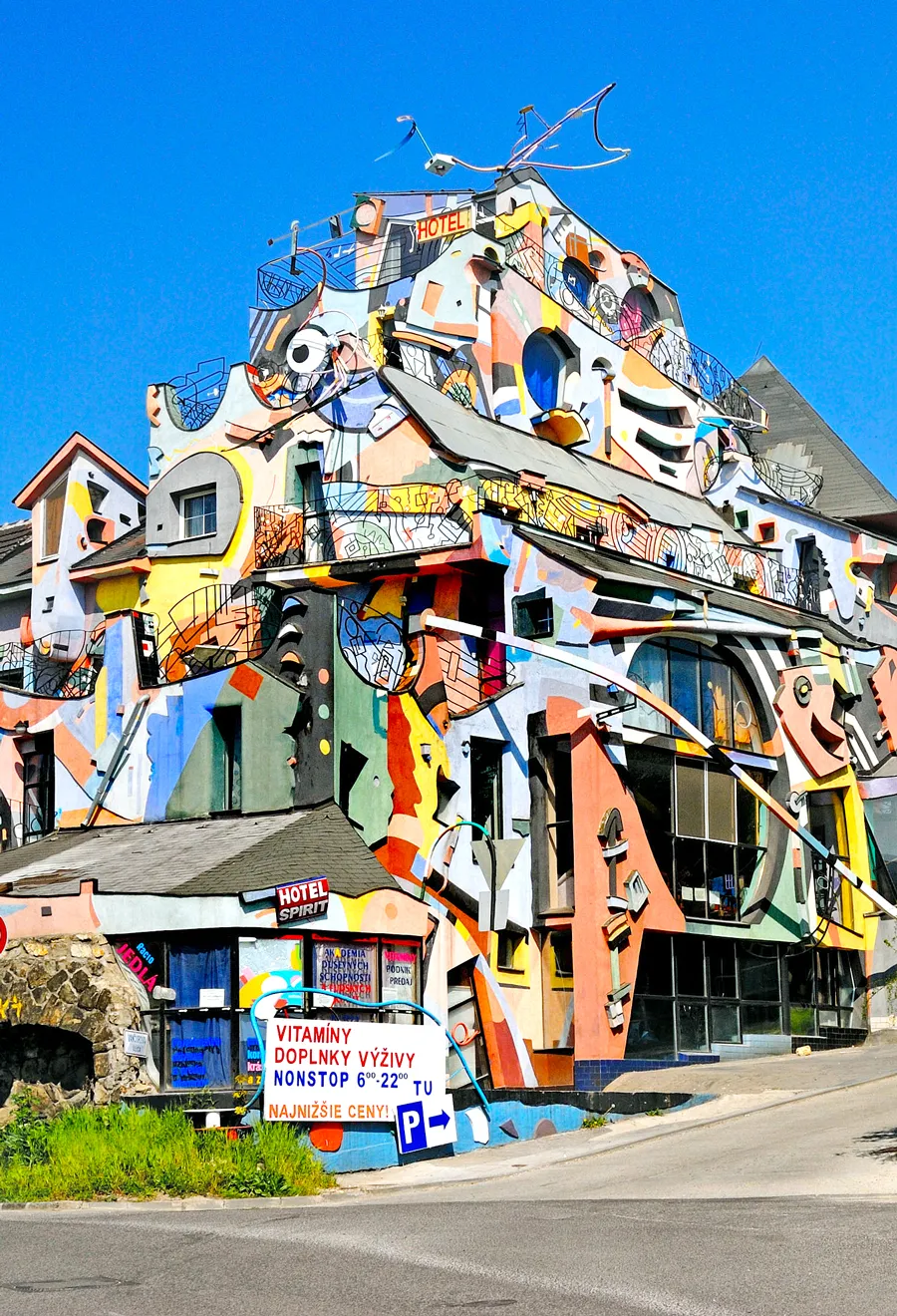Surrealism originated as a literary movement in early 20th-century Paris. In 1924, writer André Breton authored the Surrealist Manifesto, a work that blurred the distinction between dreams and reality. When applied to architecture, surrealism isn’t so much a singular style but instead an underlying principle. The unique buildings that result can be unconventional, futuristic, deconstructive, and fluid in nature. Throwing out the rule book, they demonstrate originality and creativity — whether you love it or loathe it, surrealist architecture will almost certainly provoke a reaction. Take a look at these five stunning examples of surrealist architecture from around the world.
Inntel Hotel Zaandam – Zaandam, The Netherlands
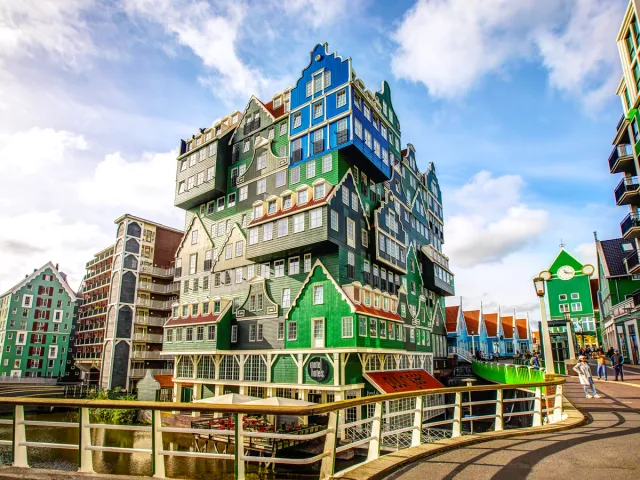
The signature houses of the Zaan region in the Netherlands informed the design for this striking hotel. Lead architect Wilfried van Winden of Delft-based firm WAM Architecten envisioned a stacked structure comprising almost 70 distinct units inspired by these residences. The end result is certainly an unusual sight, a glorious mash-up of gable ends, roofs, doors, and windows painted in bold shades of green and blue.
Though the building stands out, it’s firmly rooted in its community — an actual local building inspires each house-shaped box, whether that be the notary’s house or humble worker’s cottages. One, the Blue House, references the work Claude Monet famously painted in Zaandam in 1871.
A House for Essex – Essex, United Kingdom
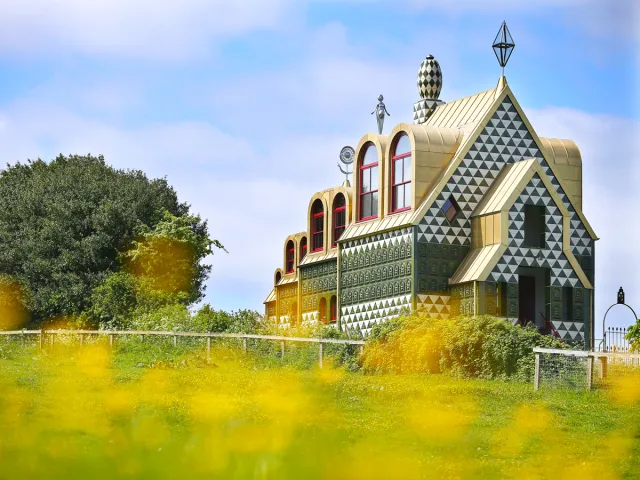
Local artist Grayson Perry collaborated with FAT Architecture to create A House for Essex, which overlooks the bucolic countryside surrounding the River Stour in the East of England. The artist designed the home with a fictional client in mind. Her name is Julie Cope, and we are invited to experience the house through her eyes.
Ornate and eclectic, A House for Essex is not only surreal but also an example of a Gesamtkunstwerk, which loosely translates to “a total work of art.” In creating it, Perry gave his imagination free rein. Elements of the structure recall northern European stave churches, yet the golden tiles that adorn its roof couldn’t be further removed from that aesthetic. Inside, Perry’s colorful artwork accentuates the bold and funky décor, leaving those lucky enough to experience the house firsthand uplifted and cheerful.
Hotel Galeria pre sebarozvoj – Bratislava, Slovakia
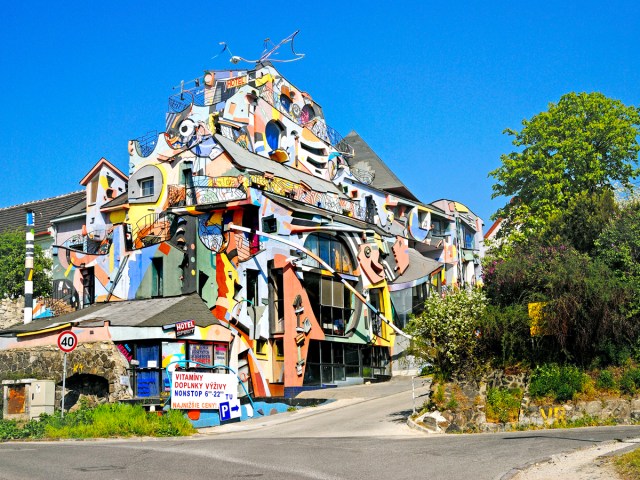
Locals know this fairy-tale hotel as the Butterfly House. An explosion of color, patterns, shapes, and quirky adornments, this attention-grabber stands at odds with the conventional buildings that surround it. Unveiled in 2011 and filled with abstract art, it’s the work of architect Štefan Polakovič — but it’s probably as close as you’ll get to seeing a Salvador Dalí painting in three dimensions.
Though the building primarily functions as a hotel, there’s an underlying commitment to self-development, health, and well-being — it even features a meditation pyramid. Experimental and avant-garde, Hotel Galeria is a marked contrast to the elegant buildings of Bratislava’s historic Old Town that lie within walking distance of this surreal landmark.
Waldspirale Hundertwasserhaus – Darmstadt, Germany
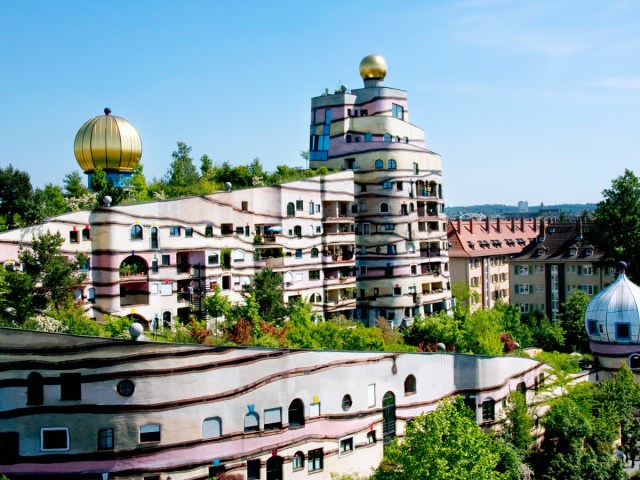
Darmstadt’s Waldspirale (“Forest Spiral”) was completed in 2000 and is just as unusual today as it was a quarter of a century ago. The U-shaped building houses 105 apartments spread over 12 floors and built around an internal courtyard. From its fluid lines to the golden onion domes and green roof, it’s abundantly clear this is no ordinary residential complex. You’ll count more than a thousand windows, but no two are alike. Inside, rounded walls and bold colors in the tile work provide further surrealist touches from the celebrated Austrian architect Friedensreich Hundertwasser.
Sharp Centre for Design at OCAD University – Toronto, Canada
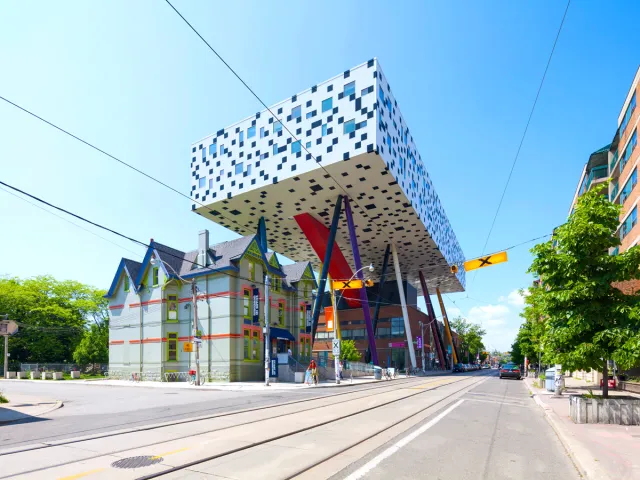
The Sharp Centre for Design in downtown Toronto bears a striking resemblance to a giant table. The building was constructed as a monochrome pixelated façade, balanced playfully on colored legs, with a covered open-sided patio beneath that provides a space for students to gather. While it’s not strictly surrealist, critics sometimes refer to it as such because of the way it appears to float above the street eight stories below.
The wacky design is the work of the late British artist Will Alsop, who worked with Robbie/Young + Wright Architects to create a building that would stand out within its neighborhood. As intended, the design has nothing in common with the buildings around it and has therefore polarized opinion. However, despite the controversy, you can’t deny it makes a statement — as the best surrealist architecture so often does.
More from our network
Daily Passport is part of Inbox Studio, an email-first media company. *Indicates a third-party property.






